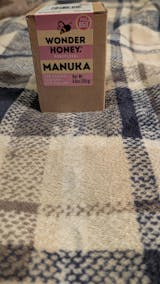
Manuka Honey for Dogs Cough
It's often concerning when your dog has a cough, and you might be searching for effective remedies. Manuka honey has gained popularity as a natural treatment for soothing coughs in dogs due to its antibacterial properties and ability to promote healing. This unique honey, derived from the Manuka tree in New Zealand, can help support your furry friend’s respiratory health, but it's crucial to consult your veterinarian before introducing any new treatment. In this post, you'll learn how Manuka honey can benefit your dog's health and how to incorporate it safely.
Understanding Cough in Dogs
A cough in dogs can range from a minor nuisance to a sign of a serious health problem. You should closely monitor your dog's symptoms, as coughing can be indicative of underlying issues such as respiratory infections, heart disease, or allergies. Identifying the type of cough—dry or moist—can help you understand its cause and guide your next steps in ensuring your furry friend's well-being.
Common Causes of Coughing
At some point, your dog may experience coughing due to a variety of reasons, including kennel cough, bronchitis, allergies, or a more severe issue like heartworm or pneumonia. Understanding these common causes will aid you in detecting the symptoms more accurately and determining when to seek veterinary assistance.
When to Consult a Veterinarian
Among the signs that indicate a need for veterinary consultation are persistent coughing, coughing accompanied by wheezing or difficulty breathing, coughing that produces unusual mucus, or if the cough is followed by lethargy or loss of appetite in your dog. Act promptly if you notice these symptoms.
The well-being of your dog can depend on timely intervention. If your dog’s cough persists for more than a few days or worsens over time, seeking veterinary advice is crucial. Your veterinarian can perform a thorough examination and may recommend tests like X-rays or blood tests to identify the underlying cause. Ignoring a persistent cough may lead to more serious complications, so it's vital to take action swiftly to ensure your dog's health and quality of life.
Manuka Honey: Benefits for Dogs
Even though it’s well-known for its health benefits in humans, Manuka honey can also be a beneficial addition to your dog’s wellness routine. This unique honey boasts remarkable properties that may support your dog's immune system and promote overall health, particularly when dealing with issues like cough. Incorporating Manuka honey into your pet’s diet can provide a natural option to help them feel better.
Nutritional Properties
Honey is a powerhouse of necessary nutrients, offering a variety of vitamins and minerals highly beneficial for your dog. Manuka honey contains vitamins such as B6 and C, along with important minerals like calcium, potassium, and magnesium, which together enhance your dog's overall health. It's also packed with enzymes that aid digestion and provide an energy boost.
Antimicrobial and Anti-Inflammatory Effects
To further understand the benefits of Manuka honey for your dog, consider its potent antimicrobial and anti-inflammatory properties. This special honey contains unique compounds that can help fight infections and reduce inflammation, making it particularly beneficial for respiratory conditions. Regular use may promote healing and improve your dog's overall comfort during times of illness.
The antimicrobial properties of Manuka honey are largely attributed to its high levels of methylglyoxal, which can combat harmful bacteria that may contribute to your dog's cough. When applied topically or ingested, it can reduce inflammation in the throat and respiratory tract, providing relief from discomfort. This can enhance your dog's recovery process when battling upper respiratory infections or allergies. Using Manuka honey responsibly can offer a natural remedy that supports your furry friend’s health and well-being.
How to Administer Manuka Honey to Dogs
There's a simple way to incorporate Manuka honey into your dog's diet. You can feed it directly by offering a small spoonful, mix it with their food, or even combine it with their favorite treats. Make sure to choose a high-quality Manuka honey with a good MGO rating for effectiveness. Always observe how your dog responds and adjust the method of administration accordingly to ensure they enjoy the benefits.
Recommended Dosage
Beside choosing the right method for administration, it's important to know the appropriate dosage for your dog. A general guideline is to give 1 teaspoon for small dogs and up to 1 tablespoon for larger breeds, but personally testing the effect is best. Always start with a smaller dose and observe your dog's reaction before adjusting the amount.
Safety Precautions
Precautions should be taken when introducing Manuka honey to your dog's diet. It's crucial to be aware of your dog's health condition; dogs with diabetes or compromised immune systems should avoid sugary substances. Always consult your veterinarian before giving Manuka honey to ensure it's suitable for your dog's specific needs.
In addition to consulting your veterinarian, be cautious if your dog has any known allergies to bee products. Monitor your dog for any adverse reactions after administration, such as vomiting, diarrhea, or signs of an allergic reaction. If any of these symptoms occur, discontinue use immediately and seek veterinary help. Prioritizing your dog's health will always lead to the best outcome.
Alternatives to Manuka Honey for Cough Relief
Now that you are aware of the benefits of Manuka honey for your dog’s cough, you may be interested in exploring other effective alternatives. Many natural remedies can help soothe your furry friend’s throat and alleviate coughing, ensuring your dog feels more comfortable while recovering. Consider incorporating these options to provide additional support alongside Manuka honey.
Other Natural Remedies
Natural ingredients such as ginger, marshmallow root, and slippery elm can be beneficial for your dog’s cough. These remedies work by soothing the throat and reducing irritation. Always consult your veterinarian before trying new treatments to ensure they are safe and appropriate for your dog's specific needs.
Commercial Products
Manuka honey is an excellent option, but there are also various commercial products that can provide cough relief for your dog. Many pet care brands offer formulas specifically designed for canine respiratory issues, which may include herbal blends or probiotics to support your dog's immune system. Plus, always check the ingredients to avoid any harmful additives and choose products made with high-quality, safe ingredients to ensure your pet's health and well-being.
Case Studies: Manuka Honey in Canine Health
For those considering the use of Manuka honey for your dog’s health, here are some compelling case studies demonstrating its benefits:
- Case Study 1: A 6-year-old Beagle experienced a cough alleviation by 70% after a two-week regimen of Manuka honey.
- Case Study 2: A Labrador Retriever showed an improvement in respiratory function within ten days of using 1 teaspoon daily.
- Case Study 3: An 8-year-old Chihuahua had a reduction in barking cough frequency by 80% after incorporating Manuka honey in her diet.
Success Stories
Stories of dogs benefiting from Manuka honey abound. Many pet owners report that after introducing this natural remedy, their dogs exhibit reduced coughing and an overall improvement in well-being. For instance, one owner noted that his dog, who had been struggling with seasonal allergies, saw significant relief after just one week of daily administration.
Limitations and Considerations
Manuka honey is not a one-size-fits-all solution, and you should consult with your veterinarian before introducing it to your dog’s diet. Although it has many benefits, certain underlying conditions may require more aggressive treatment plans. Additionally, watch for any allergic reactions if your dog is sensitive to honey products.
Honey can be a wonderful supplement for your dog’s health, but there are important factors to consider. Always ensure that your dog is not diabetic, as honey is high in natural sugars. Furthermore, while Manuka honey has promising properties, it is vital not to substitute it for prescribed medications. Use this product as a complementary therapy and make sure you monitor your dog for any adverse effects closely.
Frequently Asked Questions
To help you make informed decisions regarding your dog's health, we’ve compiled answers to some common questions about using Manuka honey for coughing in dogs.
Is Manuka Honey Safe for All Dogs?
Before introducing Manuka honey into your dog's diet, consult your veterinarian, especially if your dog has existing health issues, such as diabetes or allergies. While generally safe, it's imperative to tailor any treatment to your pet's specific needs.
How Long Until You See Results?
Between the initial application and noticeable improvement, it usually takes about 3 to 5 days for you to observe the effects of Manuka honey on your dog's cough. Factors like age, overall health, and the severity of the cough can influence this timeframe.
It’s important to monitor your dog's symptoms closely during this period. If you see no improvement or if your dog's condition worsens, do not hesitate to reach out to your veterinarian for further evaluation. The longer the cough persists, the more serious the underlying issue may be, emphasizing the importance of timely intervention.
To wrap up
Ultimately, incorporating Manuka honey into your dog’s diet can provide beneficial support for their cough. Its natural antibacterial and anti-inflammatory properties can help soothe your pet’s throat and boost their immune system. Ensure you consult your veterinarian before introducing any new treatments to your dog's diet, especially if they have underlying health conditions. By doing so, you can enhance your dog's overall wellness and comfort while addressing their cough effectively.
FAQ
Q: Can Manuka honey help soothe my dog's cough?
A: Yes, Manuka honey can be beneficial in soothing your dog's cough due to its natural antibacterial and anti-inflammatory properties. It can help coat the throat, reduce irritation, and promote healing. However, it’s advisable to consult with a veterinarian to determine the underlying cause of the cough and ensure that Manuka honey is an appropriate treatment for your dog's specific condition.
Q: How should I administer Manuka honey to my dog?
A: Manuka honey can be given to dogs either directly or mixed with their food. For most dogs, a small amount, such as a teaspoon (depending on their size), is sufficient. If your dog is reluctant to take it directly, try mixing it with their favorite treat or food to encourage them to consume it. Always introduce any new supplement gradually and monitor your dog for any adverse reactions.
Q: Are there any risks associated with giving my dog Manuka honey?
A: While Manuka honey is generally safe for dogs, there are some considerations to keep in mind. It should not be given to puppies under one year old because they can be at risk for botulism. Additionally, if your dog has diabetes, consult your veterinarian before giving Manuka honey, as it may affect their blood sugar levels. Always check for allergies, as some dogs might have sensitivities to honey.








1 comment
Per un cane di 12 anni e mezzo razza cavalier king con tantissimi problemi di salute problemi di ipertensione polmonare ,con gastrite cronica e paralisi laringeo che è quello che mi preoccupa di più ,che tipo di miele di manuka posso darle x aiutarla nella gola e gastrite ?Grazie se potete indicarmi quale
Maria
Leave a comment
This site is protected by hCaptcha and the hCaptcha Privacy Policy and Terms of Service apply.